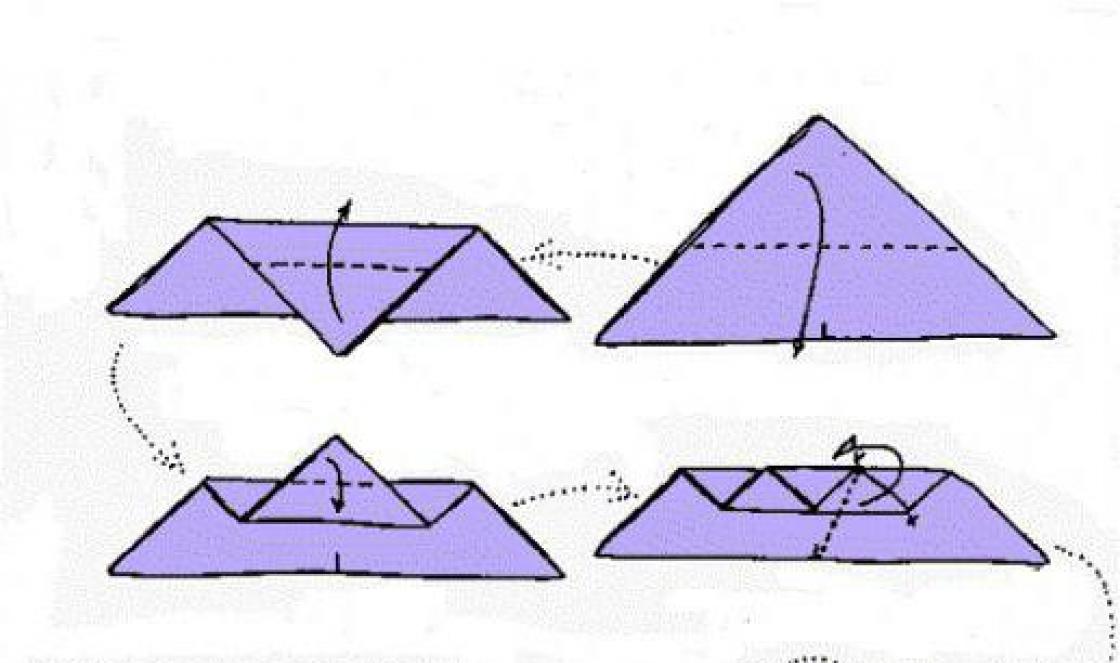Children of the 21st century. Who are they? What are they? How are they different from previous generations? What are their features and capabilities? Many questions arise when you start thinking about the topic of children of the 21st century. And the answer is obvious: they are simply different, they are more savvy and intelligent, more talented and versatile, and they can be raised in different ways. But, in any case, rest assured that when the right approach education and development of children, at the age of 7 they can already speak several languages fluently.
The first six years of a child's life are key in his development. At this stage the stage is prepared for his future successes in our modern international world.
Director of an English private children's center preschool education OC “Our children-Our school” Elaine Podovinikoff revealed some secrets of raising children.
Elaine taught for 25 years in Western Canada, where she gained experience working with children from 3 to 18 years of age. In addition to teaching in the classroom, she coordinated second language courses and chaired a committee to study and create new curriculum for minors. preschool age, selection of academic materials, and also organized student groups for tours to Russia. Over the past 15 years, 3 out of 5 of her books (2 volumes of a poetic trilogy and a biographical story) were published in the USA. The third volume of the ‘Russian Routes’ trilogy and vegetarian recipes have been published in Russia. On at the moment Elaine has been working in the educational system in Russia for 12 years and heads an English private kindergarten OC "Our children-Our school". All materials for training, education and development of children's abilities in early age, Elaine designs on her own. By the way, Elaine has three children and 9 grandchildren. And the children in the center simply call her Mrs. Pod.
What is OC? And why is there always an atmosphere of happiness there?
OC “Our children – Our school” - children's center, founded by a team of Canadian teachers who have been living in Moscow since 2000 and teaching English to children. Our goal is to make the process of immersing a child in English tongue easy and comfortable, fill every day with us with joy. In kindergarten we communicate with children exclusively in English, and even if the child does not speak English, he understands universal gestures and feels our love, feels that we accept him and respect his opinion. A week later he begins to pronounce his first phrases, and after another week he sings songs in English. Children learn very quickly, copy the behavior of other children, and learn from each other. O.C.– these are three spacious, bright rooms for three age groups: Tots– for children from 2.5 to 4 years old, Preps– from 4 to 5 years and Grads– from 5 to 7 years. A large gym, a library and a room for creativity, as well as a modern outdoor playground in a guarded area of the residential complex. Each group has a senior teacher (native speaker) and assistants at the rate of 5 children per adult, 2 nannies who speak English and a psychologist. In the summer we work with children at our summer camp in Greece.
The main thing in life and in our profession is, of course, love! Always show your child your love and let them know how much you appreciate and understand them.

Children's thoughts and their development:
- From birth to 3 months– I see, hear, smell and taste. I pay to tell you when I need something.
- From 3 to 6 months– I move my arms and legs. I'm trying to talk to you.
- 6 to 9 months– I notice when you leave the room. Unfamiliar faces, things and places can frighten me.
- 9 to 12 months– I know that you are there, even when I don’t see you. I am already a person.
- From 1 to 2 years- I recognize myself. I want to explore the world around me. I push and pull things, chew on everything, taste everything. I'm studying.
- From 2 to 3 years– I love to draw and play. I have a lot of energy. I think others think the same way as me.
- From 4 to 5 years- I dress myself. I like to make my own decisions. I'm growing up.
In the Disney cartoon, Scrooge McDuck had a thinking room, do you have a similar thinking chair in the center?
Oh yes! (Elaine laughs) This is one of the psychological moments of influence on a child, which allows him to understand for himself what he has done, to think about his actions and actions. It is very important not to combine the child and his action into one whole; there is a child who is always the embodiment of “purity and innocence”, and there is his choice, the action for which he is responsible. There is a chair, and children really love this chair, because they believe that after it they become wiser and more mature, so we limit the time they sit on the chair depending on the age of the child. For example, if a child is 4 years old, then he can sit on a chair for 4 to 8 minutes, no more.

Ways to boost your child's self-esteem:
- Celebrate your child's abilities and successes;
- Try in any situation to make your child feel that he is succeeding at something;
- Give your child a sense of stability in life;
- Notice all the positive and special features unique to your child and draw his attention to them;
- Intervene when your child does not succeed, when he is upset and does not believe that he can cope with the situation;
- Be realistic about children's self-esteem and help them cope with failures;
- Instill in your child optimism and a positive attitude towards yourself.
Elaine, in addition to classes with children, you also conduct classes/seminars with parents of children. Why do you think this is necessary?
Yes, I do, because families are different, and sometimes between the seemingly closest people, between children and their parents, there is a blank wall of mutual misunderstanding.
Excerpt from a seminar on the topic “You’re not listening...” (From Child to Parent)
You don't hear me when...
- You don't care about me
- You say you understand me before you know me better
- You tell me the solution to my problem before I fully explain what it is.
- You interrupt me without giving me a chance to finish
- You find me boring and don't talk about it
- You criticize my vocabulary, grammar or accent
- You blush to tell me something
- You tell me about your experience in a way that makes my experience seem unimportant.
- You are communicating with someone else who is in the room
- You dismiss my thanks by saying you didn't really do anything.
Can you hear me if...
- You quietly enter my own world and allow me to be myself
- You really try to understand me, even if what I say makes little sense
- You accept my point of view, even if it goes against your beliefs
- You realize that the hour I spent with you left you a little tired and empty
- You allow me such a manifestation of self-esteem as independent decision-making, even if you think that they may be wrong
- You don't take on the solution to my problems, but you allow me to deal with them in my own way.
- You're holding back your desire to give me good advice
- You don't offer me religious comfort when you feel I'm not ready for it
- You give me enough space to discover what's going on
- You accept my words of gratitude, telling me how good you feel knowing that you were helpful.
In my practice there were many interesting psychological moments on how to guide a child. The main thing is to teach him HOW to think, and not WHAT to think.
— Please tell us how you guide children using a specific case as an example.
One day the children broke a vase that, let's say, was worth 20 dollars. But the price of the vase itself is not important here; something else is important here - how to show the child that he is responsible for his actions, what his actions can lead to and how he can solve the problem on his own. There is a fact - a broken vase, we take this fact for granted. And there is a problem: how to compensate for the cost of the vase? And any problem can be solved. We gathered children who broke the vase and voiced the problem: “So! Children! You and I broke a vase that costs $20, how can we fix the problem without resorting to the help of our parents? What will be your proposals? The solution was this: the children baked cookies at home and sold them to neighbors, collected the required amount and proudly brought it to us. The result was the following: the children solved the problem on their own, their self-esteem increased, and they gained experience.
Very often, children teach their parents, and not vice versa. For example, they don’t allow me to speak Russian with them in kindergarten. As soon as this happens, they put their hands on their sides, look at me with childish cute condemnation and shout: “Mrs. Pod, English, please!
Educators must be consistent in their work, recognizing the difference between discipline and punishment. One increases the child's self-confidence, the other lowers self-esteem. Everything should be consistent, understandable and simple for the child to understand.

How to help a child grow up in society, and teach him to respect and sympathize with others:
- Communicate face to face
- Give your child the opportunity to play with other children
- Create a solid foundation
- Learn to respect your child's character
- Be attentive to your child and those around you
- To make your child feel like a full member of the family, come up with responsibilities that he could perform himself
- Encourage and praise your child when he or she does something right.
- Prepare your child to join society and help him
- Fantasize together
- Involve your child in your daily activities
- Solve problems together and look for ways to resolve the conflict together
- Don't let your child watch too much TV and watch it with him
- Let your child choose things to donate to charity.
- Be soft, loving and caring
- Set clear rules
- Allow your child to make mistakes
- Be a good example for your child
- Teach your child to understand how his actions affect others
- Let you have a common family goal, for example “Charity”
- Tell your child every day that you are proud of him!
Nikita Sokolov, editor of the journal Otechestvennye Zapiski, historian

Children born in the 21st century do not know examples from the past. For them new world- the only one possible. Therefore, from an early age, modern children are ready for competition, for the fight for survival.
The second change that influenced the child’s change is less global, but no less important. The courtyard, as one of the most important social institutions of the Soviet era, has disappeared from the lives of modern children.
If previously a child would come home from school and run into the street, where he would communicate with peers, thus learning to interact with society, then for modern children this experience turns out to be less important.
Now, sitting at the computer, the child decides for himself with whom to communicate and with whom not. On the one hand, this is not bad. But on the other hand, a child, finding himself in a real, rather than virtual world, turns out to be helpless and unable to interact normally with other people.
Natalya Kirillina, psychiatrist, candidate of medical sciences, director of the Institute of Harmonious Development and Adaptation (IGRA)

Daria Khalturina, sociologist, head of the strategic risks and threats monitoring group at the Center for Civilizational and Regional Studies, Institute of African Studies, Russian Academy of Sciences
Igor Kon, Doctor of Medical Sciences, Professor, Head of the Department of Child Nutrition of the Federal State Budgetary Institution Research Institute of Nutrition of the Russian Academy of Medical Sciences

Over the past 30-40 years, products whose existence was previously unknown have appeared in the Russian diet. On the one side, nutritional value has increased, on the other hand, fast food and other fast food products: chips, crackers have become very popular. Sweet carbonated and non-carbonated drinks have become widespread.
With these products, the child receives excess saturated fats, sugar and salt, which contribute to the development of cardiovascular diseases. There is a tendency in society to reduce the consumption of homemade food. Women have become emancipated and no longer want to cook.
Children are forced to switch to dumplings, sausages and other instant foods. Of course, avoiding natural products affects the child’s health. Another negative factor is the lack of sufficient physical activity.
Experts in various fields of knowledge told what he is like, a child of our time.
Teacher: Look inside yourself
Today's child is a new person. Its main feature is that adults often mistake it for selfishness. In fact, the child of the 21st century simply looked inside himself to find the answer to the question of self-identification in the current world. Children are looking for this answer and, what is most interesting, they find it on their own.
A child of the 21st century, unlike peers from previous generations, does not ask questions about the world. He sees planes flying, phones ringing, and emails arriving seconds after being sent - and this is the norm. One day, with my 9-10 year old students, we went to a museum where artifacts from a bygone era were displayed. In particular, there was a telephone from the 1930s, on the disk of which not only numbers, but also letters were depicted. I told you that telephones used to be landlines, that you couldn’t call from the street. And one boy, pointing to the drawn letters, remarked: “But they have already sent SMS.” Children cannot imagine that people once lived in another world. It is more important for them to learn new things about modern life. This request just needs to be satisfied somewhat differently, taking into account the era.
Historian: A world without a past
Children born in the 21st century do not know examples from the past. For them, the new world is the only possible one. Therefore, from an early age, modern children are ready for competition, for the fight for survival. The second change that influenced the child’s change is less global, but no less important. The courtyard as one of the most important social institutions of the Soviet era has disappeared from the lives of modern children.
If earlier child came from school and ran to the street, where he communicated with peers, thus learning to interact with society, then for modern children this experience turns out to be less important. Now, sitting at the computer, the child decides for himself with whom to communicate and with whom not. On the one hand, this is not bad. But on the other hand, a child, finding himself in a real and not virtual world, turns out to be helpless and unable to interact normally with other people.

Psychiatrist: Chasing success
From the first grade, and sometimes from preschool age, the child is fixated on achieving results. Recently, a fifth-grader was brought to me for consultation who stated that he was not a good student. In the conversation it turned out that “bad studies” means two B’s in a quarter. Under the influence of society, parents put pressure on their children, demand high results from them, forgetting about other values - self-respect, free time, play, family leisure. If a person constantly sets the bar too high and does not develop positive self-esteem, he will never be satisfied with the results. Not achieving what he wants, a person experiences a feeling of guilt. Hence the neuroses that are difficult to cope with even for a mature adult, not to mention children.
In the pursuit of success, people do not ask the question: are those whom they set as an example happy? It is impossible to be in a constant race. The child is deprived of ordinary joys and constantly thinks only about how to meet the expectations of his parents. If the situation does not change, we will be replaced by a generation of unhappy people. I would like to believe that this will not happen.

Sociologist: Personal freedom
A modern child can only rely on himself. Therefore, children are forced to find ways to adapt to society on their own. But not everything is so gloomy. In my opinion, positive factor, which influenced the change of today's child was the emergence of digital technologies and the Internet. Having barely learned to read, children of the 21st century become Internet users. Children themselves choose which website to go to, what to read or watch. Thanks to older children turning to the Internet, crime has decreased. All teenage subcultures are quite peaceful. Anime fans, hipsters and other communities are completely harmless. This means that the confrontation “teenager - world” is gradually disappearing. On the Internet, modern children can anonymously or openly communicate with similar children, solving similar problems. Recently I came across a teenage forum where children share their experiences. The advice they give each other is quite adequate. There is no aggression in the general population; children sympathize and empathize. Isn't this wonderful?
The modern child is an independent person, capable of making independent decisions at an early age. A child today matures an order of magnitude earlier than 10–20 years ago. Of course, many parents will refuse to take this fact into account and may not agree that their child has become different. But over time, the difference between the children of the previous generation and modern child will become more and more obvious. Today's children will be able to create a society of professionals who value personal freedom.
Doctor: Poor health

Over the past 30–40 years, products whose existence was previously unknown have appeared in the Russian diet. On the one hand, the nutritional value has increased, on the other, fast food and other fast food products: chips, crackers have become very popular. Sweet carbonated and non-carbonated drinks have become widespread. With these products, the child receives excess saturated fats, sugar and salt, which contribute to the development of cardiovascular diseases. There is a trend in society to reduce the consumption of homemade food. Women have become emancipated and no longer want to cook. Children are forced to switch to dumplings, sausages and other instant foods. Of course, avoiding natural products affects the child’s health. Another negative factor is the lack of sufficient physical activity. Even leaving computers and going outside, children rarely play energy-consuming games, and in most cases they are captivated by the same phones or tablets. Hence the increase in the number of children with poor vision and spinal problems. The child of the 21st century is poorly developed physically and susceptible to a large number diseases.





